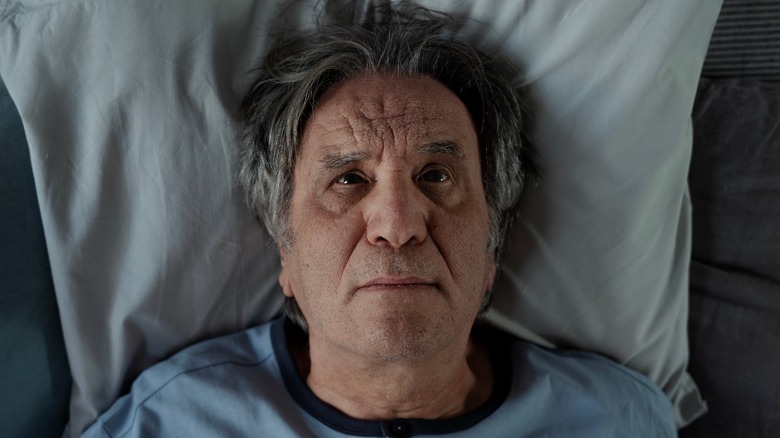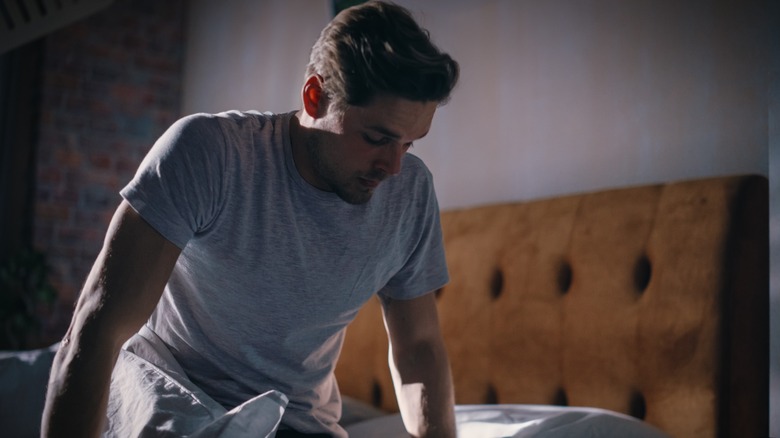Why We Rarely Wake Up To Poop In The Middle Of The Night
If you've ever been roused from a deep slumber in the middle of the night, odds are, it was probably your bladder doing the waking. The urge to get up and pee at least once during the course of the night is known as "nocturia," according to the Sleep Foundation. Nocturia knows no age limits. Approximately 40% of adults roll out of bed and make their way to the bathroom to urinate at night. This percentage increases for older adults, of whom roughly 80% experience nocturia. If waking up to pee is so common, why is it that we almost never get jolted out of a dream to go number two?
As it turns out, our colon operates on a pretty similar schedule as we do, according to a 2020 scientific review published in the Journal of Clinical Gastroenterology. The colon is part of your digestive tract and it helps expel waste from the body in the form of stool. Much like us, colon activity undergoes its own circadian rhythm, or sleep-wake cycle. While our bowels are up and at 'em during waking hours, this activity majorly slows down at night. As a result, waking up in the middle of the night to poop isn't something we normally experience on a regular basis.
Why you might occasionally wake up to poop at night
For some people, however, middle-of-the-night poops aren't so rare. If you're someone who enjoys certain foods like hot peppers, a greasy cheeseburger, coffee, or dairy, you may find yourself waking up and sprinting for the bathroom as these foods can prompt gastrointestinal issues.
Certain health conditions can also make us prone to pooping after hours. This includes viral or bacterial illness, irritable bowel syndrome (IBS), and constipation, reports Health. Even certain drugs used to treat some of these conditions, such as antibiotics, can mess with the balance of bacteria in our gut and make us more susceptible to nighttime pooping. Researchers from the previously mentioned 2020 scientific review also outline how those who tend to have fewer bowel movements on a weekly basis (between three and four) are more likely to poop during evening hours than morning hours. In more serious cases, however, people whose sleep is continuously disrupted by the need to poop night after night may be experiencing what's known as "chronic nocturnal diarrhea," explains Medical News Today.
What is nocturnal diarrhea?
Persistent nocturnal diarrhea can also be related to gastrointestinal conditions like IBS (via Medical News Today). However, those with IBS who experience nocturnal diarrhea or related symptoms such as pain, weight loss that can't be explained, or bloody stool should seek emergency medical care. Nocturnal diarrhea may also be a symptom of microscopic colitis, in which the large intestine becomes inflamed. Individuals may also experience nausea, cramps, weight loss, or difficulty controlling bowel movements. Nocturnal diarrhea has also been linked with cases of diabetes that have not been properly managed in insulin-dependent patients. Alternatively, nocturnal diarrhea may be related to secretory diarrhea, in which a person's intestine is failing to absorb electrolytes as it should. This can occur as a result of bacterial infection, intestinal surgery, the use of certain medicines, or in connection to alcohol use disorder.
If you're regularly experiencing diarrhea, whether during the day or night, be sure to speak to your doctor. Generally speaking, however, to help reduce the chances of being woken up in the middle of the night by your colon, try making any diet modifications that may be contributing to your gastrointestinal problems. In addition, prioritize healthy sleep habits. Inadequate sleep has been shown to boost inflammation, which may put one at risk for certain gastrointestinal conditions, explains Health.



